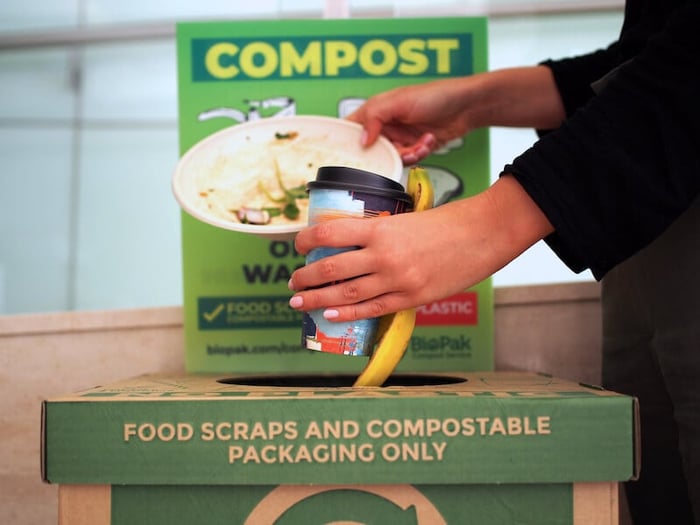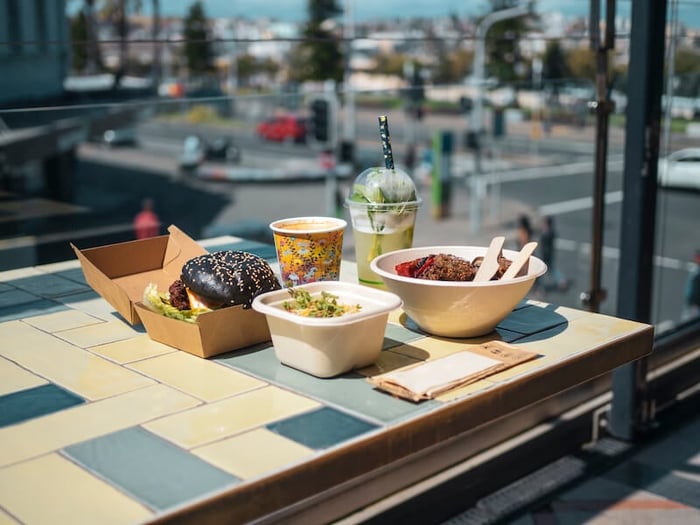
Sustainable Practices for Small Cafes: A Guide to Going Green
What's In This Post
- Why Embrace Sustainable Practices?
- Conduct a Sustainability Audit
- Source Locally and Seasonally
- Reduce Food Waste
- Implement a Zero Waste Strategy
- Sustainable Packaging
- Energy Efficiency
- Water Conservation
- Sustainable Interior Design
- Educate and Engage Your Customers
- Train and Motivate Your Staff
- Monitor and Adapt
In today's environmentally conscious world, adopting sustainable practices in your small cafe is not just an ethical choice but also a smart business move. Customers increasingly prefer businesses that prioritise sustainability, and small cafes have a unique opportunity to lead by example. In this guide, we'll explore how to implement zero waste and sustainability practices in your cafe, ensuring a greener future for your business and the planet.
Why Embrace Sustainable Practices?
Sustainable practices for small cafes are crucial for several reasons. First, they help reduce your environmental footprint, contributing to a healthier planet. Second, they appeal to a growing demographic of eco-conscious consumers. Finally, they can lead to cost savings by minimising waste and improving efficiency. With the right strategies, going green can enhance your cafe's reputation and profitability.
Conduct a Sustainability Audit
The first step towards adopting sustainable practices for small cafes is to conduct a thorough sustainability audit. Evaluate your current operations to identify areas where you can reduce waste and improve efficiency. Assess your energy usage, waste management, sourcing of ingredients, and packaging. This audit will provide a clear baseline and help you prioritise the changes needed to make your cafe more sustainable.
Source Locally and Seasonally
One of the most impactful sustainable practices for small cafes is sourcing ingredients locally and seasonally. Local sourcing reduces the carbon footprint associated with transportation and supports local farmers and producers. Seasonal ingredients are fresher, often cheaper, and require fewer resources to produce. Highlighting local and seasonal items on your menu not only promotes sustainability but also adds a unique touch to your offerings.

Reduce Food Waste
Food waste is a significant issue in the hospitality industry. Implementing strategies to reduce food waste is essential for sustainable practices in small cafes. Start by accurately forecasting demand to minimise over-preparation. Use every part of your ingredients; for example, vegetable scraps can be used for stocks and soups. Offer smaller portion sizes or allow customers to customise portions to reduce plate waste. Additionally, consider partnering with local food banks or composting facilities to ensure that unavoidable waste is put to good use.
Implement a Zero Waste Strategy
Zero waste is a key component of sustainable practices for small cafes. Aim to eliminate as much waste as possible by rethinking your operations. Start with reducing single-use items. Replace disposable cups, straws, and cutlery with reusable or compostable alternatives. Encourage customers to bring their own reusable cups and containers by offering incentives. Set up recycling and composting stations in your cafe to ensure proper waste segregation and disposal.

Sustainable Packaging
Sustainable packaging is another critical aspect of sustainable practices for small cafes. Choose packaging materials that are biodegradable, compostable, or recyclable. Avoid plastic whenever possible and opt for materials like paper, cardboard, and plant-based plastics. Clearly label your packaging to inform customers about its eco-friendly properties and disposal instructions. By prioritising sustainable packaging, you can significantly reduce your cafe's environmental impact.
Energy Efficiency
Improving energy efficiency is a fundamental part of sustainable practices for small cafes. Invest in energy-efficient appliances and lighting to reduce your energy consumption. Implement practices such as turning off equipment when not in use, using programmable thermostats, and maximising natural light. Regular maintenance of equipment also ensures optimal performance and longevity, further contributing to energy savings.
Water Conservation
Water conservation is essential for sustainable practices in small cafes. Install low-flow faucets and toilets to reduce water usage. Regularly check for leaks and fix them promptly. Educate your staff on water-saving practices, such as not running taps unnecessarily and using efficient dishwashing techniques. Additionally, consider using water-efficient methods for cleaning floors and surfaces.
Sustainable Interior Design
The design of your cafe can also reflect your commitment to sustainability. Use reclaimed or sustainably sourced materials for furniture and decor. Choose eco-friendly paints and finishes. Incorporate plants into your design to improve indoor air quality and create a calming atmosphere. Sustainable interior design not only reduces your environmental footprint but also enhances the overall customer experience.
Educate and Engage Your Customers
One of the most effective sustainable practices for small cafes is to educate and engage your customers. Inform them about your sustainability efforts through signage, social media, and your website. Encourage them to participate by offering discounts for bringing reusable items, providing information on your zero waste initiatives, and hosting sustainability events or workshops. Engaged customers are more likely to support your cafe and spread the word about your eco-friendly practices.
Train and Motivate Your Staff
Your staff plays a crucial role in implementing sustainable practices for small cafes. Provide thorough training on your sustainability policies and procedures. Motivate them by explaining the importance of these practices and how they contribute to a healthier planet. Recognise and reward staff who consistently follow and promote your sustainability initiatives. A motivated and informed team is essential for the success of your green efforts.
Monitor and Adapt
Sustainability is an ongoing journey. Regularly monitor the effectiveness of your sustainable practices for small cafes and be prepared to adapt as needed. Collect feedback from staff and customers to identify areas for improvement. Stay informed about new sustainability trends and technologies that could benefit your cafe. By continuously refining your approach, you can ensure that your cafe remains at the forefront of sustainable practices.
Adopting sustainable practices for small cafes is not only a responsible choice but also a strategic one. By conducting a sustainability audit, sourcing locally, reducing waste, and implementing energy-efficient measures, you can create a greener, more efficient operation. Engage your customers and staff in your sustainability journey, and continuously monitor and adapt your practices. With dedication and creativity, your small cafe can become a model of sustainability, attracting eco-conscious customers and contributing to a healthier planet.




